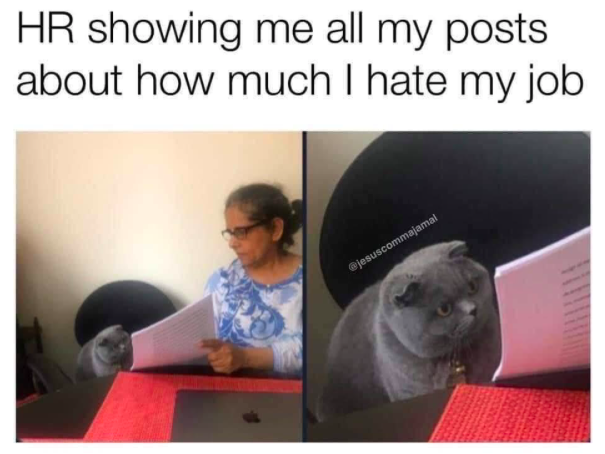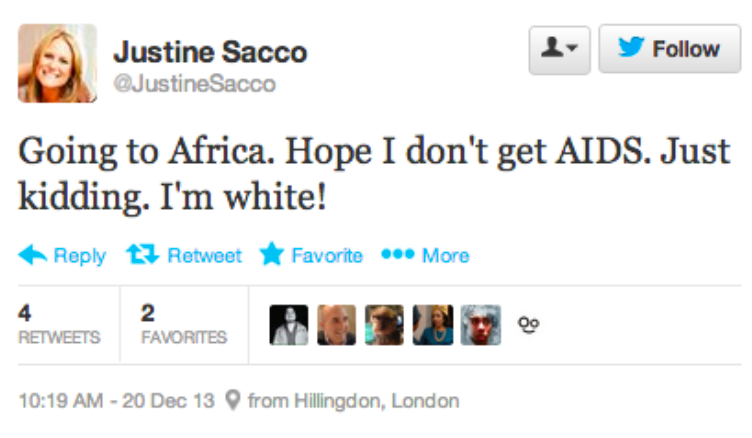If you’ve ever posted something negative online about your workplace, you might want to go back and clean up your social media after reading this. Every so often, we hear about people getting fired because of something slanderous they’ve said on Facebook, Twitter, Snapchat or Instagram. But how far does it extend? Could something you have already posted online be grounds for your dismissal?
Take this scenario as an example:
Your friend tags you in a meme about how much they hate their job and are ‘this close to quitting’.
You reply: “Omg same, I hate customers. You should’ve seen what I put up with today.”
But, uh, you work in retail, and it gets back to your boss…

Jokes aside, if they really wanted to call you out on it, you could get the sack just for those comments. It’s that terrifyingly simple. Take this single Texan mother as a real-world example.

Kaitlyn Walls, 27 at the time, says she was “just venting” when she turned to Facebook in 2015 to tell her friends she’s about to start working with children. “I absolutely hate working at day care,” she posted. “I just really hate being around a lot of kids.”
Before Kaitlyn knew it, her post was shared from her own page to a group of thousands, where she was not only insulted for her words, but fired before she even got a chance to start. The mother, saying she “wasn’t trying to offend anybody,” has changed her privacy settings since, saying she will never post anything like that again. So, it’s fair to say she’s learned her lesson.
But it’s not just FB posts that can get you fired.
Back in 2013, communications director Justine Sacco was fired for a single tweet:

The 30 year old’s post became a worldwide trend while she was up in the air on her way to Africa. When the hashtag #HasJustineLandedYet went viral, thousands awaited her occupational demise once she landed. While she did say sorry, this wasn’t enough to save her job.
In a more recent case earlier this year, the High Court upheld a decision to fire a public servant for tweeting information (under an “anonymous” account) relating to the Government’s Border Protection Policies. The Department of Immigration found the account (@LaLegale) belonged to employee Michaela Banerji.
As a part of her job requirement, Michaela was to remain “apolitical”. Obviously she didn’t do that, and was therefore justifiably fired. In fact, the majority in High Court said: “As a rule of thumb, anyone who posts material online, particularly on social media websites, should assume that at some point, his or her identity and the nature of his or her employment will be revealed”.
And let’s not forget snapchat.
In the instance below, a police officer in Detroit was fired for a snapchat selfie that was accompanied by a questionable caption:

Referring to the Detroit community as “zoo animals”, 27 year old cop Sean Bostwick was dismissed in 2018 not long after this snap was brought to the attention of the “shocked” chief James Craig. With over 80 per cent of Detroit’s population being African American, “blacker than any big city in America”, you can see how seriously wrong his choice of words (and incorrect spelling of wrangle*) were.
Will deleting our post save us, though?
It sounds pretty obvious, but with social media all it takes is one screenshot for it to never truly disappear… and, if its brought to legal attention, there are ways of finding posts even after you delete them.
I’m not trying to scare you, but in the worst case scenario of slanderous comments, if you’re caught and someone wants to sue you, your primary line of defence is, well, to bring actual legal defences into it.
But why can we get fired for our opinions? Surely that breaches human rights, doesn’t it?
In Australia, while we can express our opinions and thoughts through commentary and personal expression, there’s actually no law that says we have explicit freedom of speech. A lot of the time, employers have incorporated terms into their employment policy (and therefore part of the contract you signed when you decided to work there) that you MUST maintain professionalism. This professionalism extends outside of working hours. If something you say could bring the company into disrepute – and with a place as widespread, instantaneous and often permanent as social media – yes, you can be fired for your opinion if it goes against the company your work for.
Is it limited to what we say about our company?
Not always. Generally, it will depend on these key things: the nature of your contract, company policy, the role itself, and what it actually is that you’ve posted. The ongoing Israel Folau scandal is a prime example of where freedom of speech and hate speech meet at a controversial crossroad.

The former Christian rugby player was sacked for expressing his views towards “drunks, homosexuals, adulterers, liars, fornicators, thieves, atheists and idolaters” on social media; saying hell awaits them. While he claims unfair dismissal by Rugby Australia, Folau breached their code of conduct and therefore Rugby Australia had no choice but to terminate his contract. While he didn’t say anything bad about footy, he did say something slanderous, and according to his contract, that was not tolerated and was grounds for his dismissal.
So, all in all, whether it’s about customers, clients, the actual role itself, or even something that is seen as bigoted or highly distasteful outside your occupation, be careful. It could very well cost you your job. Obviously some cases are more extreme than others, but they all teach us the same thing: we need to be cautious about what we post. An emotionally fuelled rant, even if it is seemingly unrelated to the occupation we work for, could very well be grounds for getting the sack.
Here’s a good thing to keep in mind before we post anything questionable: If my boss saw this, would I be worried? If your answer is yes, well, maybe don’t post it… Just in case.

